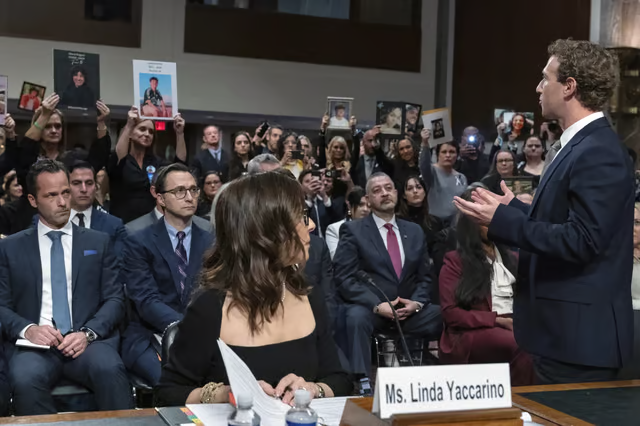Zuckerberg apologizes to victims’ families in emotional Senate hearing on child exploitation
In a highly emotional Senate hearing on child exploitation, Mark Zuckerberg offered apologies to victims' families as lawmakers and parents expressed growing concerns about the adverse effects of social media on young people.
CEOs from major social media companies, including Meta, TikTok, and X, testified before the Senate Judiciary Committee on Wednesday, addressing issues such as sexual predators, addictive features, mental health concerns, and bullying affecting young users. The hearing began with recorded testimonies from children and parents who shared their experiences of exploitation on social media, with some parents silently holding up pictures of their deceased children who had succumbed to suicide.
Senate Majority Whip Dick Durbin, who chairs the committee, blamed social media companies for the dangers children face online, pointing to their design choices, inadequate investments in trust and safety, and a focus on engagement and profit over basic safety.
During a heated exchange with Mark Zuckerberg, Republican Senator Josh Hawley questioned whether Meta had compensated victims and their families. While Zuckerberg acknowledged he was not personally aware of such compensation, Hawley pressed for an apology to the victims' families, leading to a moment where parents in the audience held up pictures of their children. Zuckerberg expressed remorse, stating, "I’m sorry for everything you have all been through," and emphasized Meta's ongoing efforts to enhance child protection.
Despite the executives' claims of existing safety tools and collaboration with nonprofits and law enforcement, lawmakers and advocates insisted that social media companies are not doing enough. Criticism was particularly directed at Meta, with Arturo Béjar, a former engineering director, accusing the company of adopting a "trust us" approach that feels like gaslighting.
Senator Hawley pressed Zuckerberg on personal responsibility, emphasizing the harms caused by Meta. Other senators, including Lindsey Graham, expressed concerns about the dangers of current social media designs and urged collaboration to address the "dark side" of these platforms.
Executives from TikTok, Snapchat, and X defended their safety measures and supported legislative initiatives to hold platforms accountable for recommending harmful content to minors. Snapchat, in particular, backed a federal bill promoting legal liability for such platforms. However, child health advocates argued that social media companies have repeatedly failed to protect minors and called for independent regulation.
While bipartisan agreement emerged during the hearing, it remains uncertain whether legislative action, such as the proposed Kids Online Safety Act, will materialize. Meta faces legal challenges, with dozens of states suing the company over allegations of intentionally designing features that addict children and expose them to online predators.
Internal emails released by Senator Richard Blumenthal's office revealed concerns within Meta about the impact of its products on youth mental health. The emails showed calls for increased staffing to address wellbeing concerns, indicating a growing urgency as global politicians raised alarms about the effects on young people.
In recent weeks, Meta has introduced enhanced child safety features, including hiding inappropriate content from teenagers' accounts on Instagram and Facebook and restricting minors' message reception capabilities. Despite these efforts, questions about the impact of social media on children's mental health persist, and notable absentees, such as YouTube, raise further concerns about the effectiveness of current regulatory approaches.

.png)
Comments
Post a Comment